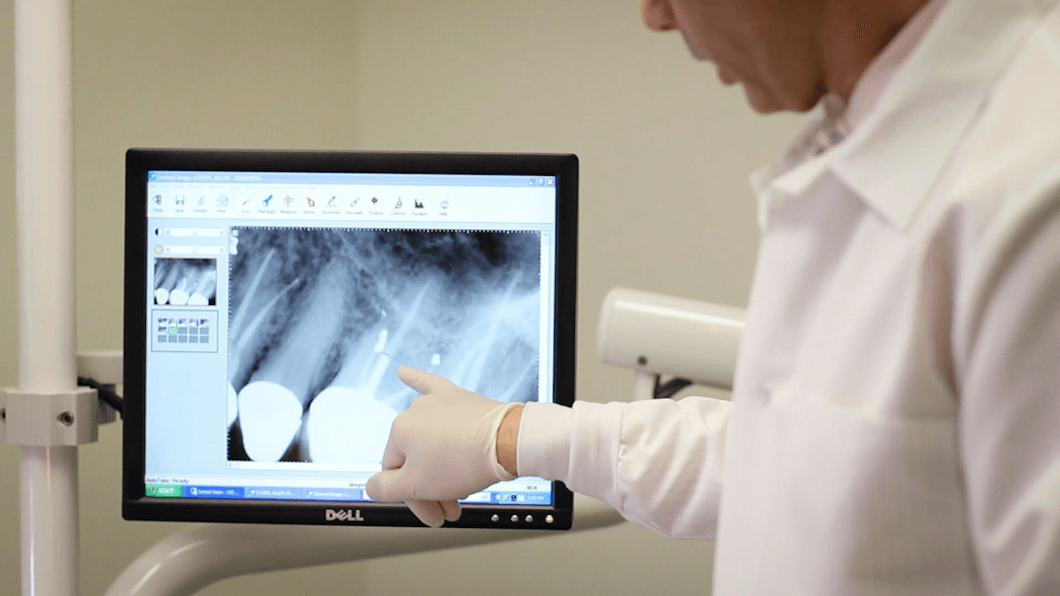
North Shore & Brookline Endodontics (NSBENDO) provides Root Canal Treatment in Brookline, Peabody, Beverly, Gloucester, and Newburyport. Contact us today at one of our five locations to learn more about our services and schedule your appointment.
Our primary goal is to help patients save their natural teeth.
Our Boston area endodontic practice specializes in root canal treatment. The word “endo” comes from the Greek language and means “inside” or within. Endodontists work with the “inside” of a tooth. Root canal treatment is commonly performed when the dental pulp becomes inflamed or infected due to deep decay, old restoration, cracks, or trauma. Some signs that your tooth has pulp damage include prolonged sensitivity to cold or heat, sensitivity to biting, swelling or tenderness in the gingiva near the affected tooth or discoloration in the tooth structure. In some cases, you will have no physical symptoms. Teeth may have 1 to 4 main canals depending on tooth position in the mouth. We use our expertise, experience and advanced technology to find and successfully treat the entire root canal space. Endodontic treatment combined with an appropriate restoration by your dentist can add decades of service to the tooth that otherwise would be extracted.
People often ask, “What does it mean to have root canal treatment and how does it save my tooth?” The procedure is typically done in one or two visits. This is based on a case-by-case discretion. During root canal treatment the pulp of the tooth is removed painlessly under profound local anesthetic and then roots are filled with a suitable filling material. As a result of removing the inflamed or necrotic pulp, your symptoms will subside and the tooth will return to its normal state. After treatment is completed and the tooth is completely comfortable, your general dentist will place a crown or a permanent restoration in the tooth to strengthen and restore full function to the tooth. This is advised within a couple weeks of having the procedure to ensure the long- term success of the tooth. You should avoid chewing on the treated tooth until it has been restored by your general dentist to avoid fracturing the tooth.
Pre-operative and post-operative instructions for root canal treatment can be accessed by clicking in the imbedded link.
At North Shore & Brookline Endodontic, we take the time to thoroughly assess the risk factors in every case. When needed, we use 3D imaging CBCT scans and clinical microscopic examinations to evaluate the case.
Most teeth can be endodontically treated. Occasionally, a tooth can’t be saved due to a severe fracture, calcified canals or inadequate bone support. Our endodontists will collaborate with your dentist to recommend the best possible treatment for your specific case.
For more information regarding root canal treatment, please visit the American Association of Endodontics.
Root Canal Treatment (Explained)
Root Canal Treatment (Summarized)
If you are dealing with tooth pain, our experienced endodontists are here to help. Through advanced dental medicine and modern dentistry, we use digital x rays to examine the damaged tooth, determine the extent of tooth decay, and identify concerns such as an abscess, infected pulp, or irritated nerve tissue and blood vessels. When infection is left untreated, it can lead to bone loss, additional complications, and other further complications that affect your long term oral health and dental health.
Our approach to root canal therapy and endodontic therapy focuses on removing bacteria, cleaning the inner chamber, and carefully sealing the canals to prevent reinfection. This precise care often helps fix issues caused by deep decay or dental trauma, while preserving your natural tooth and avoiding tooth extraction. For most patients, a successful root canal treatment provides lasting relief and restores comfort.
From your first consultation to your final follow up appointments, our compassionate team ensures you know what to expect at every stage of your root canal experience. We encourage you to schedule an appointment for prompt evaluation and immediate treatment, helping protect your healthy, confident smile.
Frequently Asked Questions About Root Canals
The only sure way to know if you need root canal treatment is through an examination from a dental professional. However, there are a few signs that can signal you may have decay that has reached the inside of the tooth, such as:
- A dull, chronic toothache
- Pain or sensitivity when chewing
- Sensitivity to cold or hot foods or beverages
